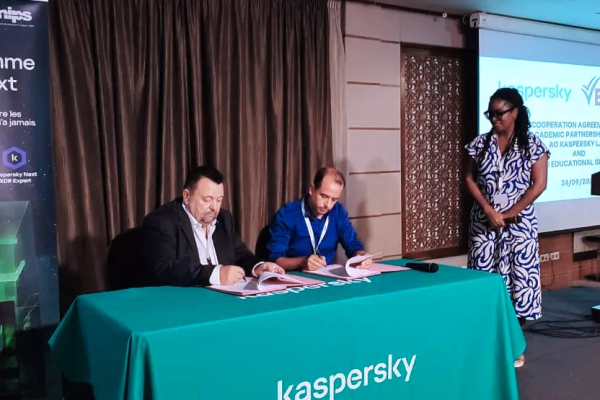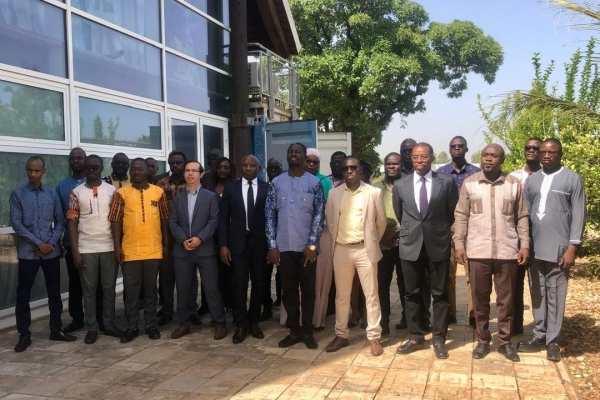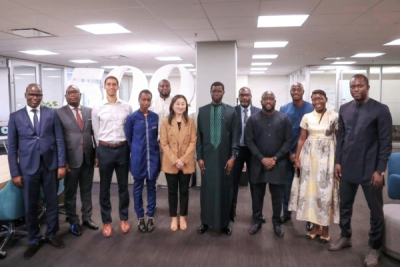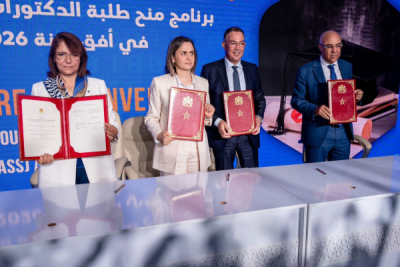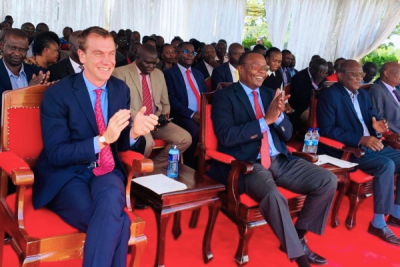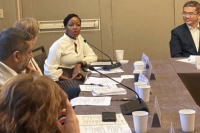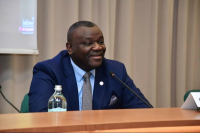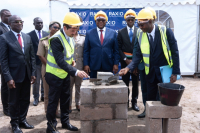
Tech (804)
The acceleration of digital transformation in Africa has created a growing demand for cybersecurity professionals. According to the World Economic Forum, the global talent shortage in this field could reach 85 million workers by 2030.
Last week, Russian cybersecurity provider Kaspersky partnered with EPI Sup de Sousse, a private Tunisian university, to train a new generation of cybersecurity experts, foster innovation, and strengthen Tunisia's cybersecurity ecosystem.
This partnership comes at a time when Tunisia is facing a high number of cyber incidents. In 2023, TunCERT, the country's national computer emergency response team, recorded nearly 150,000 incidents affecting the national cyberspace. Of these, 46% were phishing attacks, while 17% involved malware.
According to the International Telecommunication Union (ITU), Tunisia scored 82 out of 100 in the 2024 cybersecurity index, placing the country in Tier 3, indicating a "basic commitment to cybersecurity actions led by the government." However, this score marks a decline from 2020, when Tunisia scored 86.23, positioning it as one of the continent’s leading players.
For Kaspersky, this partnership could help identify future talent and contribute to the development of Tunisia's cybersecurity community. According to the World Economic Forum’s Cybersecurity Talent Framework, there is an urgent need for nearly 4 million professionals in 2024 to bridge the global talent gap, with a growing demand for expertise in cloud security, artificial intelligence, and machine learning within the cybersecurity sector.
Adoni Conrad Quenum
African countries are rapidly modernizing their digital systems, adopting a range of technologies to improve efficiency and transparency. As they embrace this digital transformation, they also need to prioritize cybersecurity to protect sensitive data and prevent potential threats.
Burkina Faso plans to modernize and secure its online services with the adoption of a national public key infrastructure (PKI). On Monday, September 30, the country’s National Agency for Information System Security (ANSSI) launched a project framework workshop in Loumbila, located in the Oubritenga province.
“PKI is a technology that secures electronic exchanges using digital certificates, comparable to electronic passports. These certificates verify users' identities and ensure that only authorized individuals can access or sign information,” explained Boukaré Sébastien Yougbare, ANSSI’s Director General.
This initiative reflects the government’s commitment to modernizing public services while strengthening the security of the country’s digital space. It comes at a time of accelerated digital transformation, marked not only by the rapid adoption of electronic communication services but also by a rise in cyberattacks.
The project, set to be implemented by December 2025, is being carried out in partnership with the American firm Cybastion Institute of Technology. This infrastructure will play a key role in digitizing administrative processes and offering citizens greater security when accessing online public services. Additionally, the PKI will allow businesses to secure their online transactions and provide reliable authentication of their partners. Banks will also benefit from this tool to enhance the security of electronic transactions while complying with regulatory requirements.
With the adoption of the PKI, Burkina Faso will follow the example of several other African nations, such as Ghana, Cameroon, and Ethiopia, which have already implemented similar infrastructures to bolster digital security. According to a report by consulting firm Future Market Insights, the global PKI market generated $3.9 billion in revenue in 2021. The market is expected to continue growing at an annual rate of 18.3% between 2022 and 2032, underscoring the increasing importance of these technologies in an increasingly digital world.
Samira Njoya
Senegal has made significant progress in digital transformation in recent years. To build on this momentum and better meet the needs of its population, the government wants to leverage international expertise.
Last week, Senegalese President Bassirou Diomaye Faye met with several companies on the sidelines of the 79th United General Assembly. The aim of the meetings was to seek partnerships in the digital sector. According to a post on the X (formerly Twitter) account of the Senegakese presidency, Bassirou Diomaye Faye and his delegation held productive discussions with leaders from NVIDIA, a global leader in artificial intelligence. Concrete avenues of cooperation were identified to strengthen Senegal's technological ecosystem.
“The president discovered the most advanced AI technologies, applicable in key areas of the National Transformation Agenda 2050: agriculture, education, health, and more. These innovations will enhance our ability to tackle future challenges and position Senegal as a tech hub in Africa,” the presidency indicated.
The president also met with representatives from 500 Global, a worldwide startup investment fund and incubator. This meeting uncovered investment opportunities to support the growth of innovative digital companies in Senegal.
Another significant meeting took place with Ketan Patel, vice president of HP, the American laptop manufacturing company. Discussions centered on the country's ongoing digital transformation and key challenges related to cybersecurity.
Additionally, President Faye visited the facilities of Starlink, a SpaceX subsidiary specializing in satellite connectivity. Talks focused on potential collaboration to deploy this technology, with a particular emphasis on improving connectivity in rural areas.
These various meetings are part of the Senegalese government's ambitious "New Deal Technologique" initiative. This project aims to forge strategic partnerships and position Senegal as a digital hub in Africa. The country hopes to create over 50,000 direct jobs and 160,000 indirect jobs through the digital sector, boosting its contribution to the national economy to more than 10% by 2030.
Samira Njoya
Africa's digital economy is undergoing rapid expansion, but there is a growing need for infrastructure to support it. Creating a digital economic zone will provide the foundational infrastructure for this growth by enabling tech companies to operate in a streamlined, business-friendly environment.
Africa Finance Corporation (AFC) and Itana, Nigeria’s first licensed digital economic zone management company, have formalized a partnership to develop Africa's first digital economic zone. Announced at the Global Africa Business Initiative (GABI), on September 26, during the United Nations General Assembly (UNGA) in New York, the zone is intended to provide a seamless platform for global and Pan-African tech, finance, and service-based businesses to scale across Africa.
Samaila Zubairu, President & CEO of AFC, described the initiative as a "pivotal step" towards creating a hub for Africa’s digital economy, adding that it will cement “the Corporation’s commitment to driving innovation, job creation, and sustainable economic development across the continent.”
The Itana Digital Economic Zone, based in Lagos, Nigeria, will operate as an online jurisdiction, allowing businesses to incorporate and manage their operations remotely. This platform will be optimized with laws, tax incentives, and services geared toward supporting the digital economy, alongside eco-friendly live-work districts and a live-in accelerator program designed to foster innovation and sustainability in Africa’s tech ecosystem.
AFC will provide project development funding and lead the financing for phase 1 of the Itana project, which is expected to cost approximately $100 million. This phase includes the development of a tech campus in Lagos and startup funding through Accelerate Africa, a partnership between Itana and Future Africa.
This development provides a framework for businesses seeking to tap into Africa’s growing digital economy. The project will be located in Alaro City, within the Lekki Free Zone, and will collaborate with partners like Future Africa, PwC Nigeria, and the Charter Cities Institute.
Nigeria is home to one of the largest startup ecosystems in Africa. According to the Nigerian Investment Promotion Commission, the country raised over $1.2 billion in startup funding in 2021 alone. Creating a digital economic zone will provide much-needed infrastructure, legal frameworks, and incentives to accelerate the growth of these startups, making Nigeria a global tech player.
Hikmatu Bilali
To ensure a successful digital transformation, Morocco is prioritizing the development of a highly skilled workforce. The country is strategically partnering with government agencies and private sector organizations to address this critical need.
Morocco's Ministry of Digital Transition and Administrative Reform on Wednesday announced the signing of three partnership agreements to support the country's "Morocco Digital 2030" strategy. The agreements, with government ministries, public institutions, and private sector stakeholders, aim to accelerate Morocco's digital ambitions.
The first agreement, a program contract for 2024-2030, focuses on developing the outsourcing sector. Signatories include the Ministry Delegate for the Budget, the Caisse de Dépôt et de Gestion, the Tanger Med Special Agency, and the Moroccan Agency for Investment and Export Development. The goal is to boost service migration and position Morocco as a regional outsourcing leader.
The second agreement, funded by the Ministry of Digital Affairs, will launch a scholarship program for doctoral assistants. In partnership with the Ministry of Higher Education and the National Center for Scientific and Technical Research, the program will offer 550 scholarships worth 7,000 dirhams per month for three years. It aims to foster research and innovation in digital technology.
The third partnership, financed by the Ministry of Digital Transition, will promote research in advanced technologies and train a new generation of digital specialists. In collaboration with the Ministry of Economic Inclusion, the agreement seeks to strengthen national expertise in these critical areas.
These agreements align with the "Morocco Digital 2030" strategy, which aims to create 240,000 direct jobs in the digital sector and contribute 100 billion dirhams to GDP by 2030. Morocco is committed to becoming a key player in the global digital economy.
Samira Njoya
The digital transformation underway in Africa aims, among other things, to equip populations with essential digital skills to adapt to the demands of the modern world. It is crucial that this modernization be inclusive, ensuring everyone can benefit from the opportunities the digital age offers.
The British government has announced a funding of 390 million shillings ($3.02 million) to improve digital access in Kenya. This information was revealed on Monday, September 23, by the British Deputy High Commissioner to Kenya, Ed Barnett (, left), during the launch of a digital agricultural project in Busia County. The funding is aimed at enhancing digital access in the counties of Busia and Mandera, specifically for marginalized populations.
"Putting young people, women and persons with disabilities at the heart of development is transformative. The UK is committed to working with Kenya to ensure these underserved groups within the population enhance their digital skills and their access to vital services like e-citizen, secure jobs and participate meaningfully in this digital world," said Ed Barnett.
This initiative is part of the "Strengthening Digital Communities" project, which seeks to promote the digital inclusion of marginalized groups in these regions. The goal is to reach more than 190,000 people, including 10,000 young people, while contributing to Kenya's ambition to train 20 million citizens in digital skills by 2027.
The collaboration between the British High Commission and the Kenya Information Communication and Technology Action Network (KICTANet) will particularly focus on digital employability. It will identify high-potential young women and youth, training them in job-ready skills, mentoring, financial management, and entrepreneurship.
The financial support will also facilitate ongoing digitization efforts in Busia and Mandera counties, through community awareness campaigns on cybersecurity, digital hygiene, and the benefits of digital inclusion. Furthermore, the project will support the production of research, policy briefs, and other strategic documents aimed at improving public ICT policies.
Samira Njoya
In 2023, Rwanda adopted a national artificial intelligence (AI) policy, aiming to leverage this technology to drive growth across various sectors.
Rwanda and Singapore unveiled the "AI Playbook for Small States" on Sunday at the United Nations General Assembly, offering guidance for smaller nations navigating the complexities of artificial intelligence (AI) adoption.
The playbook, developed by the Digital Forum of Small States (Digital FOSS), highlights best practices and lessons learned from its members. Small states often face unique challenges in implementing AI strategies, including limited resources, talent shortages, and the intricacies of developing governance frameworks.
According to the document, small states face unique challenges in adopting AI, such as limited resources, difficulty accessing talent, and the complexity of developing governance frameworks. Josephine Teo, Singapore’s Minister for Digital Development and Information, noted that her country has worked to identify common obstacles and spotlight successful solutions for effective AI adoption.
In this era of digital transformation, AI is increasingly becoming one of the key technologies. A study conducted by McKinsey in collaboration with Rwanda’s Ministry of ICT and Innovation suggests that an investment of $76.5 million in the implementation of Rwanda’s national AI strategy could generate $589 million in the next five years.
The "AI Playbook for Small States" covers a range of topics, including AI development, its impact on governance, security, and society. The document will be regularly updated with new practices and solutions implemented by countries in their journey toward AI adoption.
Adoni Conrad Quenum
Digital payments in India have experienced explosive growth in recent years, largely due to the success of its Unified Payments Interface (UPI) system. Buoyed by this achievement, India has expressed its readiness to support other nations in developing their own digital payment systems.
India is working to assist several African nations in establishing their own digital payment systems, inspired by the success of its Unified Payments Interface (UPI). The National Payments Corporation of India (NPCI) has begun discussions with at least 20 countries across Africa and South America to adapt the UPI model, with the goal of enhancing financial inclusion on the continent.
Launched in 2016, UPI facilitates real-time payments, allowing users to transfer funds directly between bank accounts for both peer-to-peer transactions and transactions between customers and businesses. The system has already been successfully implemented in countries such as Sri Lanka, the United Arab Emirates, and most recently, Namibia. In February 2023, Mauritius also adopted UPI as part of a broader strategy that includes the introduction of RuPay cards.
The initiative to implement this payment system in Africa is motivated by the positive outcomes observed in India, where UPI has significantly transformed the financial landscape. By December 2023, UPI transactions reached 12 billion for that month alone, totaling over 100 billion transactions for the year and exceeding a value of $2 trillion.
In Africa, where a substantial portion of the population remains unbanked, this digital solution offers a vital opportunity to promote both digital and economic inclusion. A report from November 2023 by AfricaNenda, an independent organization focused on developing instant payment systems on the continent, indicated that 27 African countries have yet to adopt instant payment functionalities. Additionally, a McKinsey study forecasts that electronic payment revenues in Africa could reach $40 billion by 2025, underscoring the growing interest in investing in this infrastructure.
Samira Njoya
About two weeks ago, the Democratic Republic of Congo (DRC) presented its financing needs and business opportunities in the digital sector in China. The country plans to implement several major projects.
The Democratic Republic of Congo's (DRC) Minister of Posts, Telecommunications, and Digital Economy, Augustin Kibassa Maliba, is seeking opportunities in the United States to advance the country's digital sector. From Friday, September 20 to Friday, September 27, he is in New York, leveraging his participation in the 79th United Nations General Assembly to meet with key partners at Google’s Manhattan office, as well as with various government and international organizations. The discussions will focus on innovative solutions for digital cooperation.
The Ministry of Posts, Telecommunications, and Digital Economy has stated that the visit will also showcase investment opportunities within the DRC's digital sector. Kibassa Maliba is set to participate in a bilateral meeting between DRC President Félix Tshisekedi and Polish President Andrzej Duda at the Polish consulate in New York.
The DRC has made digital transformation a core part of its strategy for economic diversification. The sector is viewed as a key growth driver for the country’s future. Priorities include improving high-speed connectivity across the nation to enhance digital inclusion, transforming public services, and opening the market to international investors offering high-value digital products and services.
According to the GSMA, broadband availability combined with digital technologies could boost agricultural yields by 10.5% to 20% and increase profits by 23% in sub-Saharan Africa. In small and medium-sized enterprises, internet access and digital solutions could enhance labor productivity by 2% to 4%. The DRC stands to benefit from similar growth.
In its national digital plan, the DRC government aims to make digital technology "a lever for integration, good governance, economic growth, and social progress." The country requires expertise and funding to realize this vision, and the discussions and potential agreements formed in New York could significantly contribute to these efforts.
Muriel Edjo
Raxio Group is continuing its expansion in Africa, having already deployed data centers in Uganda, Ethiopia, Mozambique, and the Democratic Republic of Congo (DRC).
Data center operator Raxio Group announced earlier today the inauguration of its data center in Abidjan, Côte d'Ivoire, as part of its African expansion strategy. Raxio Côte d'Ivoire (CIV1) aims to meet the growing demand for connectivity, storage, and data processing in Côte d'Ivoire and across the West African Economic and Monetary Union (WAEMU).
Certified as a Tier 3 facility, CIV1 offers neutrality regarding telecom operators and cloud services. The data center can accommodate up to 800 racks and provide 3 MW of computing power.
"Abidjan is the ideal location for organizations and businesses from across the economic region to colocate their mission-critical infrastructure in a highly reliable and secure facility. We are proud to contribute a fundamental cornerstone to facilitate Côte d’Ivoire’s continued digital growth and cement its hub status in the region," said Robert Mullins, CEO of Raxio Group.
CIV1 is Raxio Group's fifth data center in Africa. Its inauguration follows the launch of DRC1, Raxio's data center in the Democratic Republic of Congo (DRC), about a month earlier. This expansion aligns with Raxio's 2019 commitment to build 10 to 12 data centers across the continent to meet the increasing demand for digital services.
These investments come amid a significant shortfall in supply, caused by the late adoption of data centers in the region. As of mid-2023, Africa hosted less than 2% of the global colocation data center capacity, with more than half located in South Africa, according to the "Data Centres in Africa Focus Report" by Oxford Business Group, published in April 2024. The report also notes that Africa needs 1,000 MW and 700 facilities to meet demand and bring capacity density in line with that of South Africa, the region's leader.
Isaac K. Kassouwi
More...
The first-ever Arewa Tech Fest is scheduled for September 25 and 26, 2024, in Kano, Nigeria. To support young Nigerian innovators, a tech fund will be launched as part of the event.
On Monday, September 23, the Arewa Tech Fest, a technology festival in northern Nigeria, announced the launch of a $50 million fund named the Arewa Tech Fund. The initiative aims to foster a strong digital ecosystem in the region.
“The Arewa Tech Fund represents a significant step towards harnessing the potential of our youth and fostering a culture of innovation that will not only benefit Northern Nigeria but also have a far-reaching impact across the nation. We are committed to investing in solutions that drive sustainable growth, and this fund will play a vital role in building the next generation of tech leaders and innovators,” said Mallam Nasir El-Rufai, former governor of Kaduna State and one of the project’s initiators.
This initiative comes at a time when investment in Africa’s tech sector has been declining. According to the Africa 2023 Investment Report Crisis or Adjustment by Briter Bridges, this drop is not due to a lack of sector appeal but rather the absence of mega-deals ($100 million+ funding rounds) as global venture capital markets slow down.
This global slowdown has impacted African start-ups, with 89% of venture capital in the continent’s tech ecosystem coming from foreign sources, according to the United Nations Development Programme (UNDP). In Nigeria, start-ups raised $1.8 billion in 2021, $1.2 billion in 2022, and just $469 million in 2023, according to Partech Africa data.
The Arewa Tech Fund will provide local innovators with the capital and resources necessary to develop their tech projects. In the long term, the fund is expected to stimulate economic growth and create jobs in the region.
Adoni Conrad Quenum
The ongoing digital transformation in Senegal requires significant funding to reach its full potential. To advance the projects, the country needs strategic partners.
Senegalese President Bassirou Diomaye Faye (photo, left) met with Bill Gates (photo, right), founder of the Gates Foundation, on Monday, September 23, during the 79th United Nations General Assembly in New York. According to a statement from the Senegalese presidency, the meeting focused on several strategic areas of cooperation, including optimizing agriculture through artificial intelligence, improving sanitation infrastructure with digital solutions, and integrating technology to modernize other key economic sectors.
This collaboration aligns with the new government's ambitions to position Senegal as a digital hub in Africa, speeding up its digital transformation. The program outlined by President Faye includes international partnerships to support the digitalization of essential sectors, aiming to increase the digital sector's contribution to GDP to over 10% in the coming years.
If discussions progress as expected, the Gates Foundation could play a key role in this transformation, particularly by integrating artificial intelligence to boost agricultural productivity and improve access to essential services. The Foundation is also expected to provide technical and financial support to strengthen the country's technological capacities, accelerating the modernization of infrastructure and priority sectors.
Active in Africa since its inception in 2000, the Gates Foundation is one of the world's largest philanthropic organizations. It has supported numerous projects across the continent, from fighting infectious diseases to improving access to information and communication technologies (ICT) for vulnerable populations.
Samira Njoya
Founded in Cameroon, in 2017, ST Digital has now expanded its operations to include Congo, Togo, Benin, Gabon and Côte d’Ivoire.
Cameroon-based cloud service provider ST Digital launched, last week, operations in the Democratic Republic of Congo (DRC). The company will leverage the OADC Texaf Kinshasa, a neutral, open-access Tier 3 data center inaugurated in August 2024.
"The DRC's digital transformation creates immense opportunities for content providers, and our expansion into this market is a key element of our growth strategy. By partnering with OADC Texaf Kinshasa, we can ensure that our content reaches audiences with the speed, security, and quality they expect," said Jean-Francis Ahanda (photo), general manager of data center services at ST Digital
With that launch, ST Digital continues to expand its African footprint that includes countries like Cameroon, Congo, Togo, Benin, Gabon and across Africa, already operating in several countries, including Cameroon, Congo, Togo, Benin, Gabon, and Côte d’Ivoire.
The expansion comes at a time of rapid digital transformation, with growing demand for cloud services, particularly among businesses. According to the "Africa Cloud Business Survey 2023" by UK-based consultancy PwC, published in February 2024, 50% of companies in Africa have already adopted cloud services for all or most of their operations. Additionally, 61% of companies on the continent are expected to have fully migrated to the cloud within the next two years.
Isaac K. Kassouwi
To succeed in its digital transition, Morocco must rely on a skilled workforce in digital professions. By training talent tailored to market needs, the country aims to align the skills of its graduates with the growing demands of the digital economy.
The Moroccan Ministry of Digital Transition and Administrative Reform and the Foundation for Research, Development, and Innovation in Science and Engineering (FRDISI), signed a partnership agreement on Friday, September 20, in Rabat. The initiative aims to support research and development in the field of digital transformation.
"The agreement will oversee 18 doctoral thesis projects in digital-related fields, with a monthly stipend of 7,000 dirhams (around $722), along with guidance and supervision over three years," the ministry said in a statement.
This new agreement is part of the Moroccan government's efforts to enhance the skills and talents of young people in the sectors of digitalization and new technologies. It is also a key component of the upcoming national digital strategy, titled "Morocco Digital 2030," set to be launched in the coming days.
The strategy aims to train 45,000 digital talents annually, transition 50,000 young people into digital professions, and attract 6,000 new foreign talents each year. It places a strong emphasis on developing a talented and creative youth to bolster Morocco's global competitiveness.
By investing in its youth, particularly through its doctoral candidates, Morocco is betting on innovation and advanced research to strengthen its international competitiveness. This strategy seeks not only to meet the job market's skills demands but also to cultivate a workforce capable of sharing its knowledge. The goal is to position the kingdom as a key player in the technology sector, attracting foreign investment and fostering the emergence of innovative solutions.
Samira Njoya


